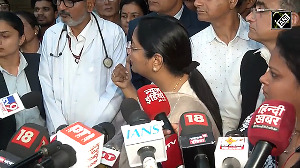"According to new testimonies gathered from October 2005 to January 2006 by a court in Dallas, the seven-times Tour de France winner told a Indiana University Hospital doctor on October 28, 1996 he had taken performance-enhancing drugs," Le Monde said.
"The doctor questioned him on a possible use of doping products after his brain surgery in order to prescribe his post-surgery treatment.
"In front of (former team mate) Frankie Andreu and his wife, who have testified under oath in Dallas, Armstrong said he had taken 'EPO, testosterone, growth hormones and cortisone'."
Armstrong, who retired after his record seventh consecutive victory last July, has always denied taking banned substances.
The International Cycling Union (UCI), cycling's governing body, declined to comment when contacted by Reuters.
"The doctor started by asking ordinary questions. And then, all of a sudden, 'have you taken doping products? And he answers 'yes'. Then he asks which ones. And Lance goes: 'EPO, growth hormones, cortisone, steroids, testosterone, " Betsey Andreu, a former friend of Armstrong's, was quoted as saying in court by Le Monde.
BLOOD BOOSTER
EPO increases the blood's oxygen-carrying capacity, making it particularly valuable for endurance athletes such as riders, distance runners and cross-country skiers.
It is especially valuable in cycling stage races where it offsets the decrease in red blood cells that occurs over several weeks of racing.
Armstrong went to the Dallas court to refer a dispute with his insurance company to arbitration. SCA had refused to pay the Texan a five million dollar bonus following his victory in the Tour de France 2004.
The 34-year-old American, who revealed in October 1996 he had undergone surgery to cure testicle cancer with metastasis in his brain and lung, returned to cycling in 1999 to record his first Tour victory.
The French sports daily L'Equipe reported last August that it had access to laboratory documents and that six of Armstrong's urine samples collected on the 1999 Tour showed "indisputable" traces of the blood-boosting drug erythropoietin.
EPO was at the heart of the 1998 Tour de France scandal in which Willy Voet, a member of the Festina team, was caught with a huge cache of doping materials.
Dutch lawyer Emile Vrijman, a former director of the Netherlands' national anti-doping agency, was appointed by the UCI last October to investigate the allegations.
Vrijman said the World Anti-Doping Agency and the French national doping laboratory had effectively pronounced Armstrong guilty of a doping violation without sufficient basis.
WADA head Dick Pound rejected the Vrijman report as "bordering on the farcical."








 © 2025
© 2025